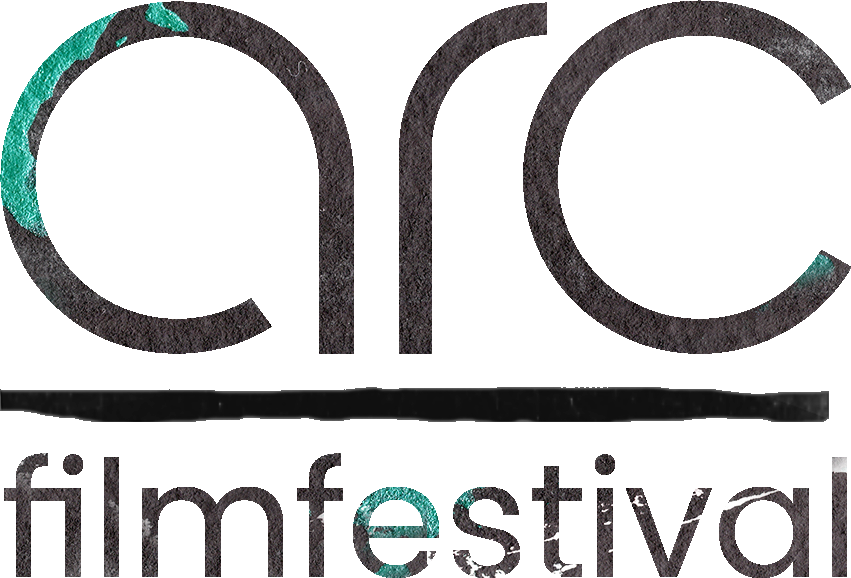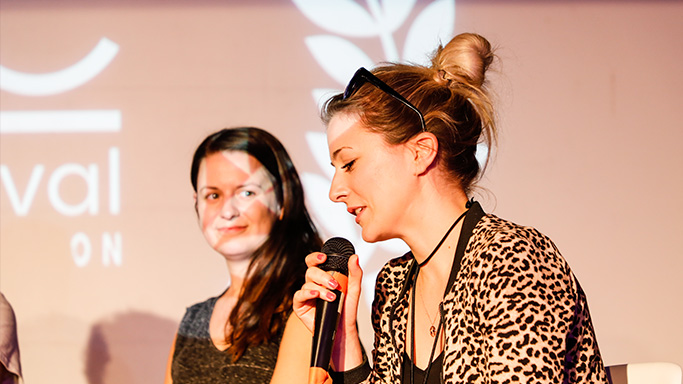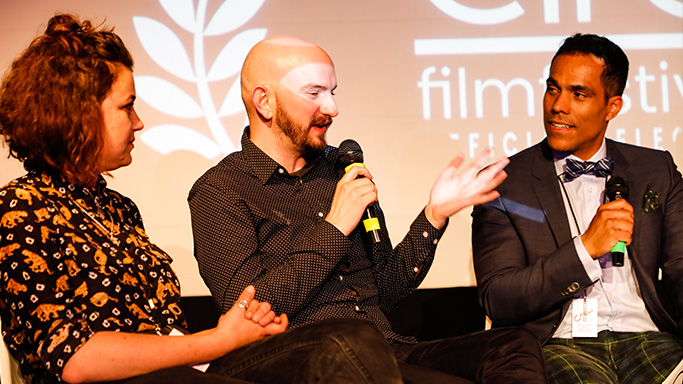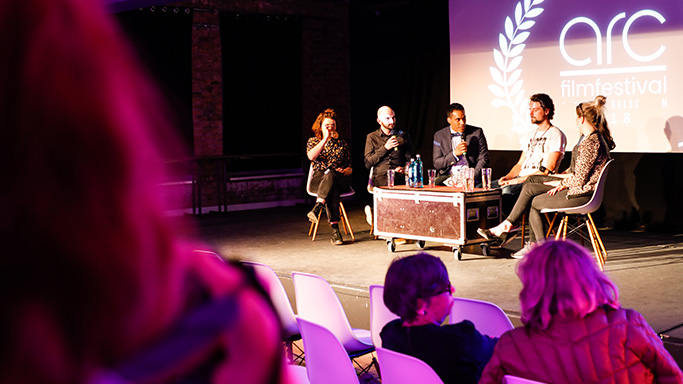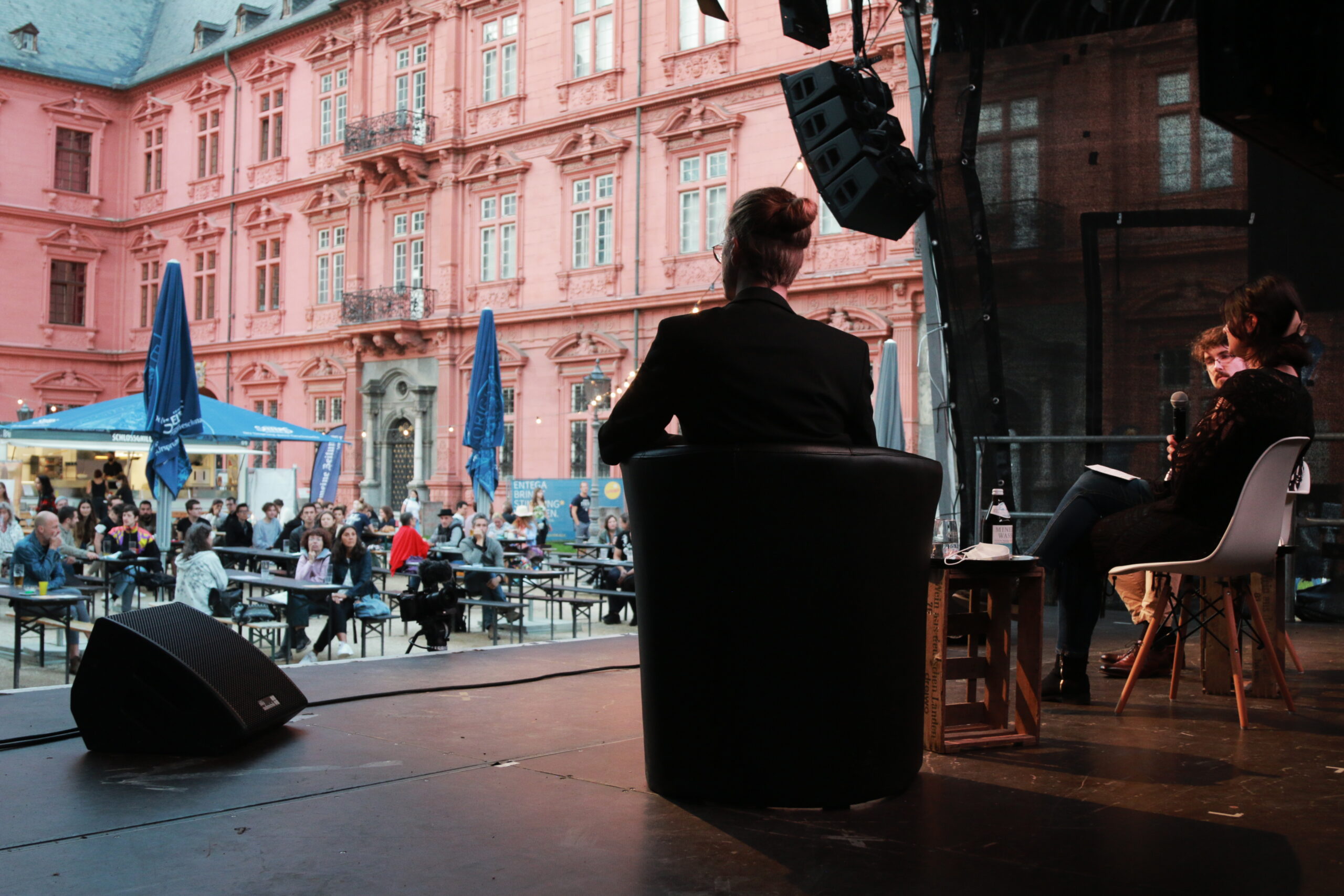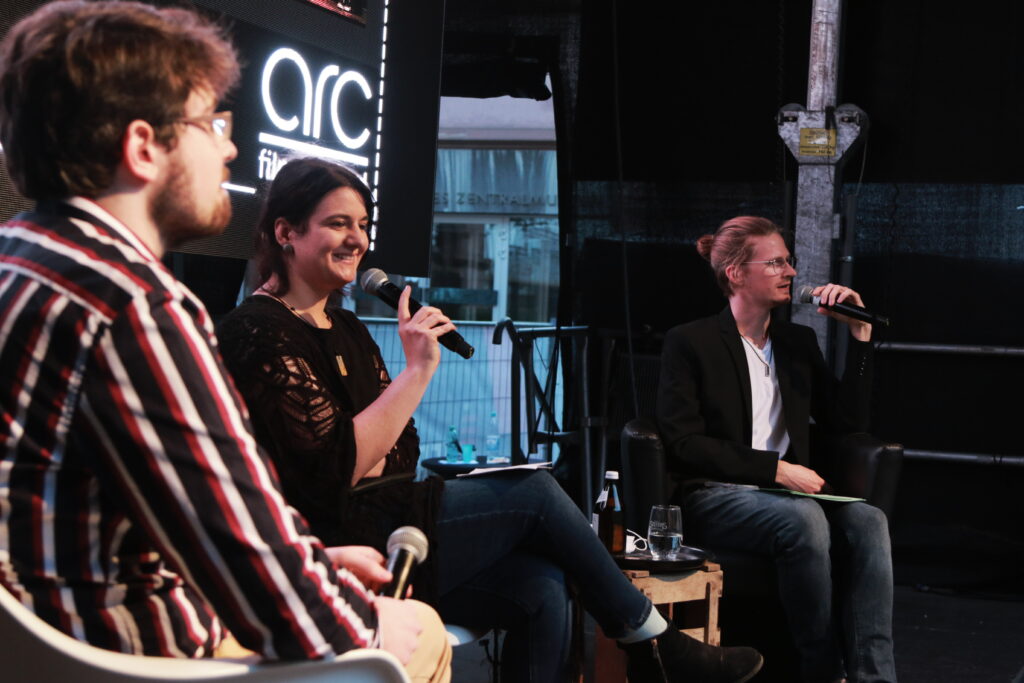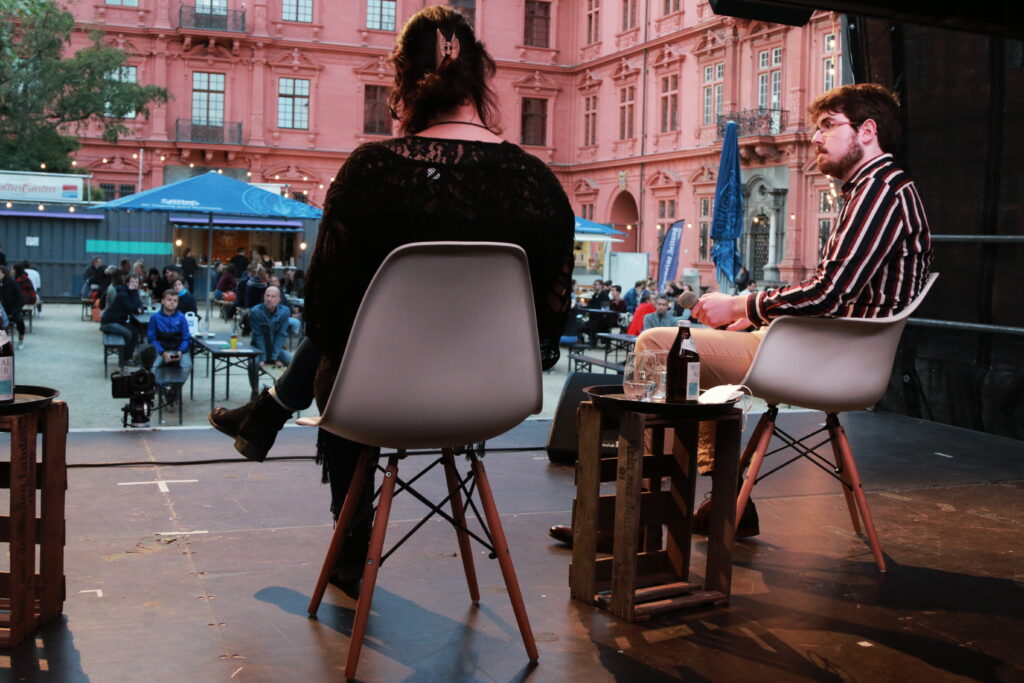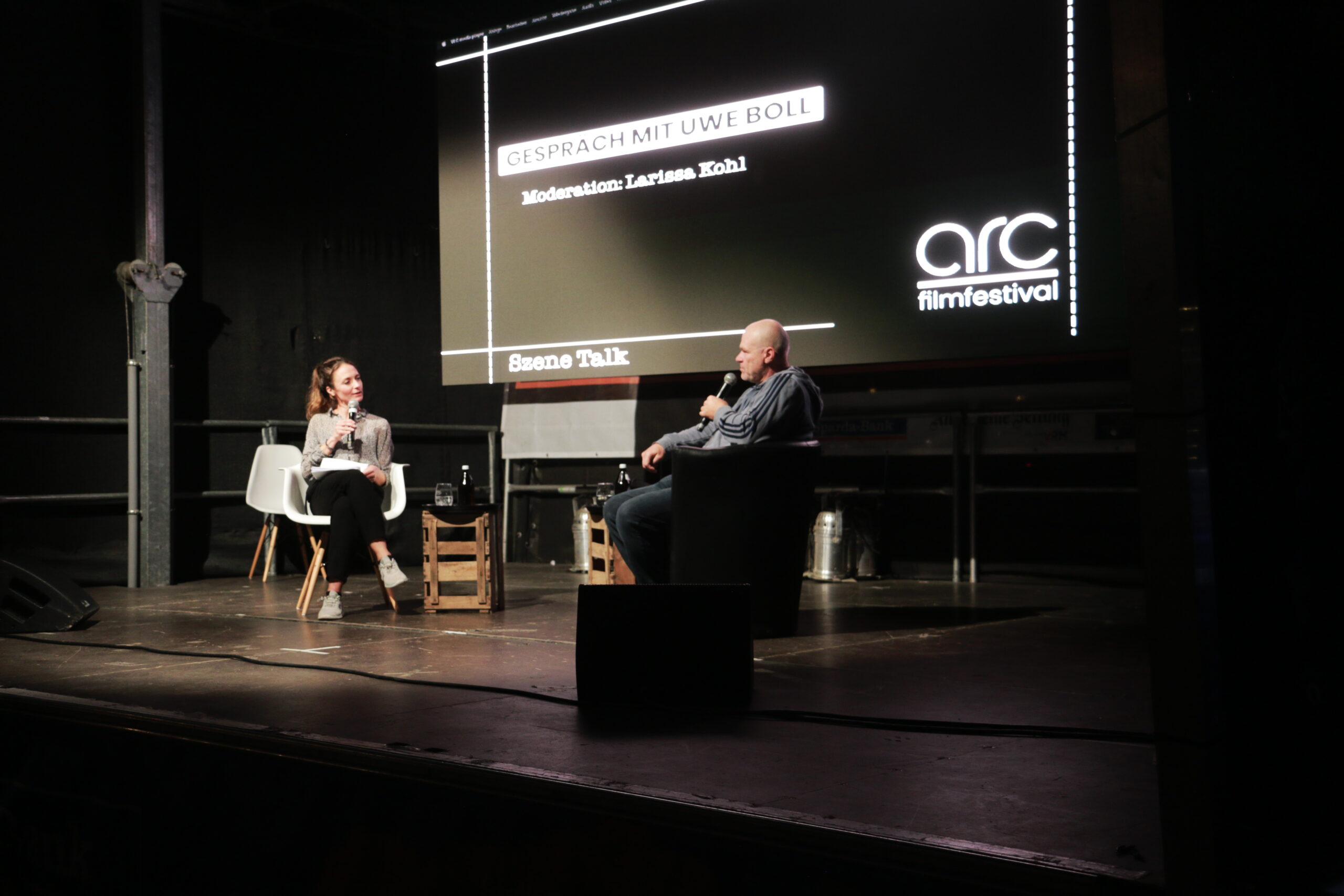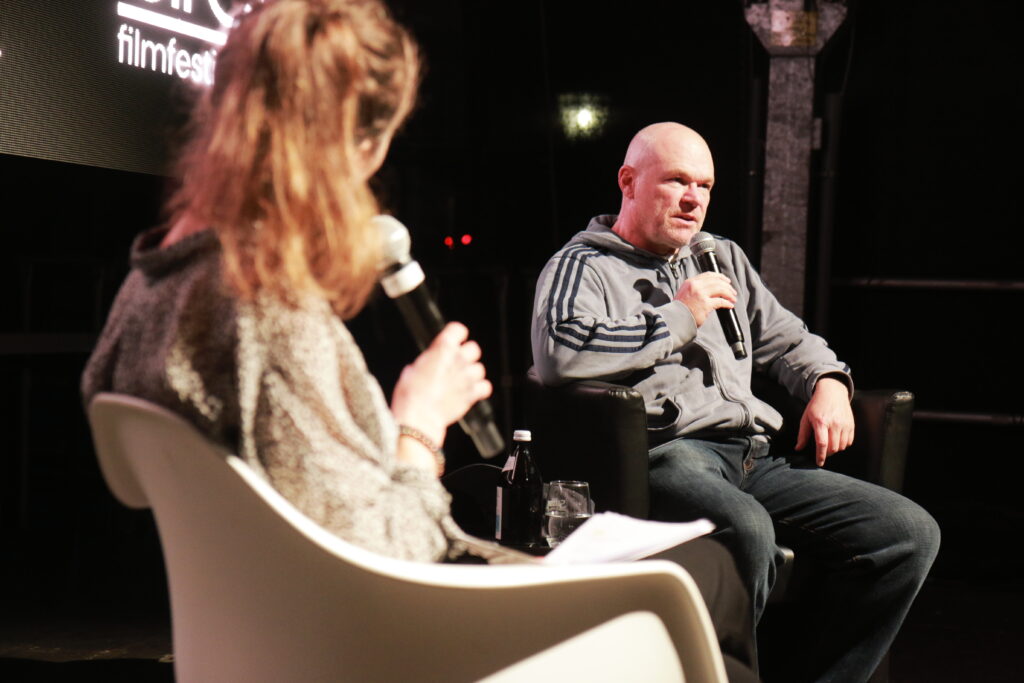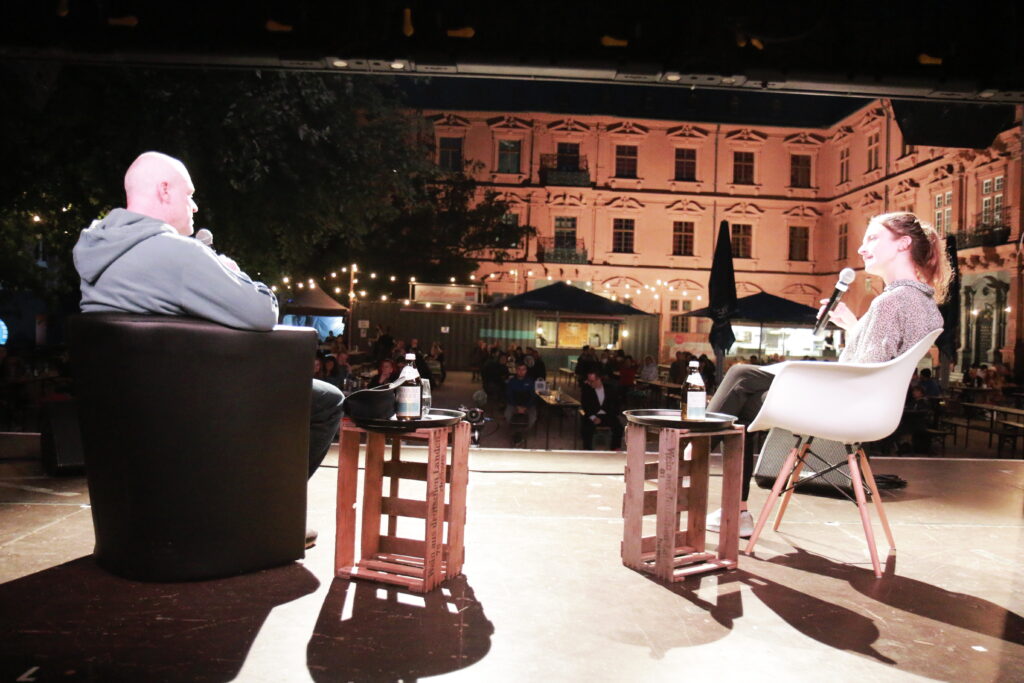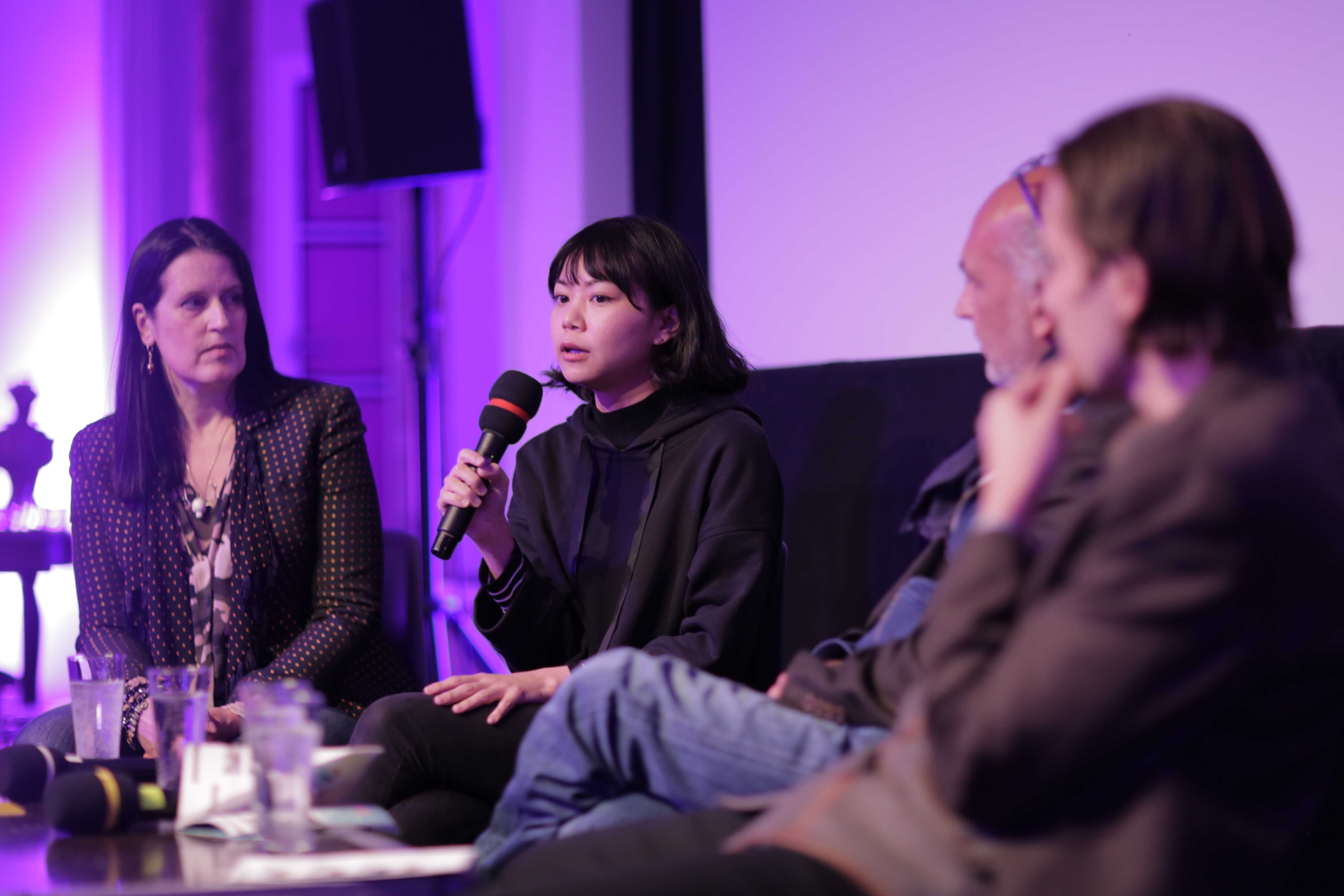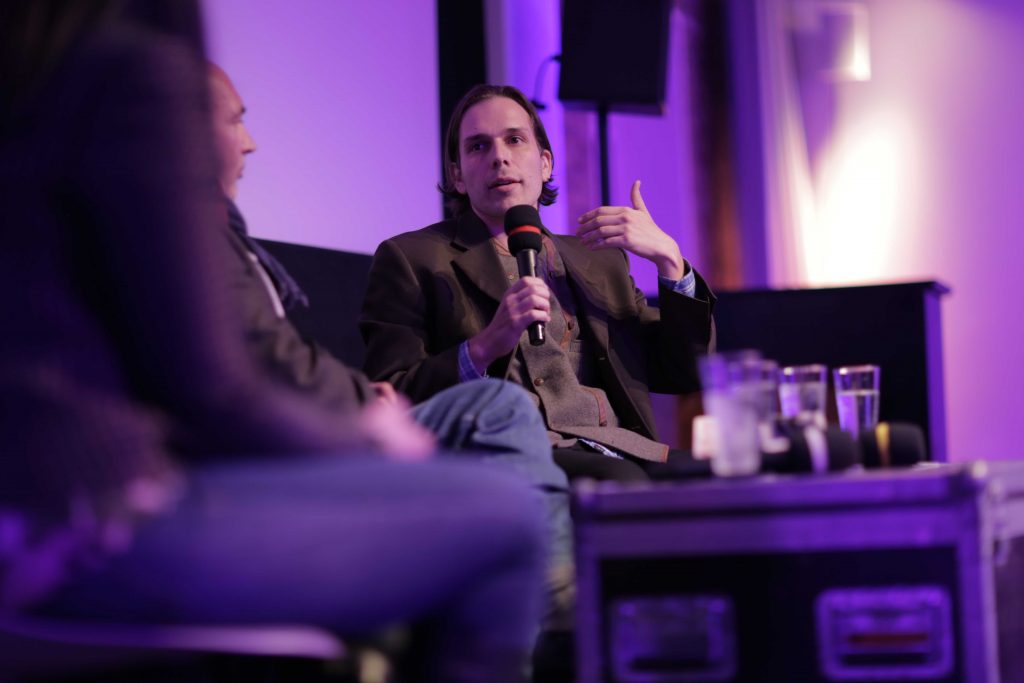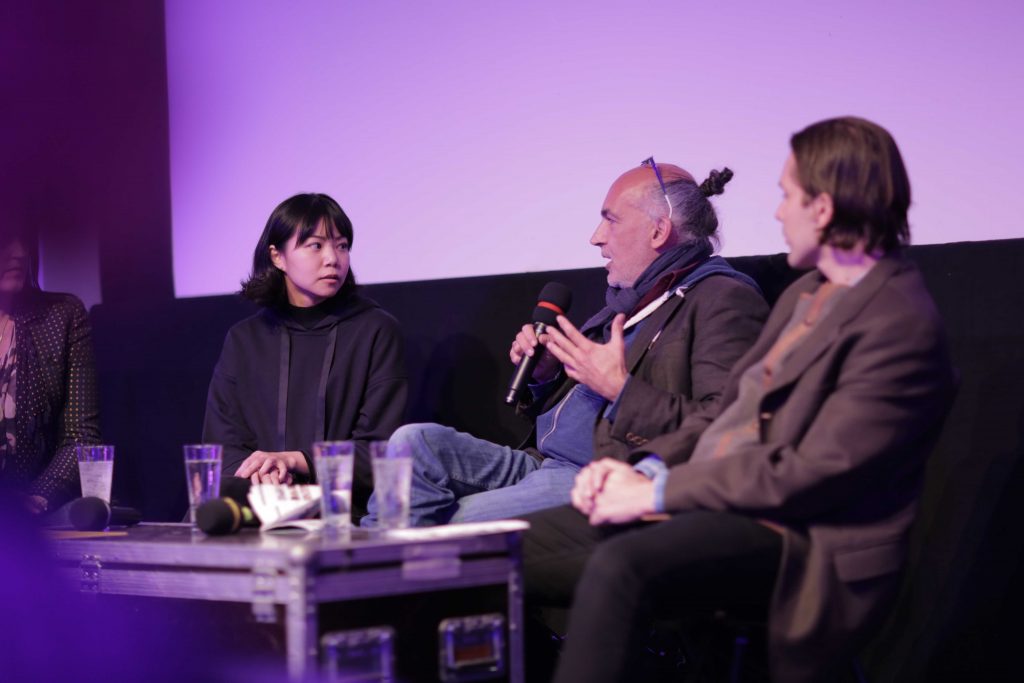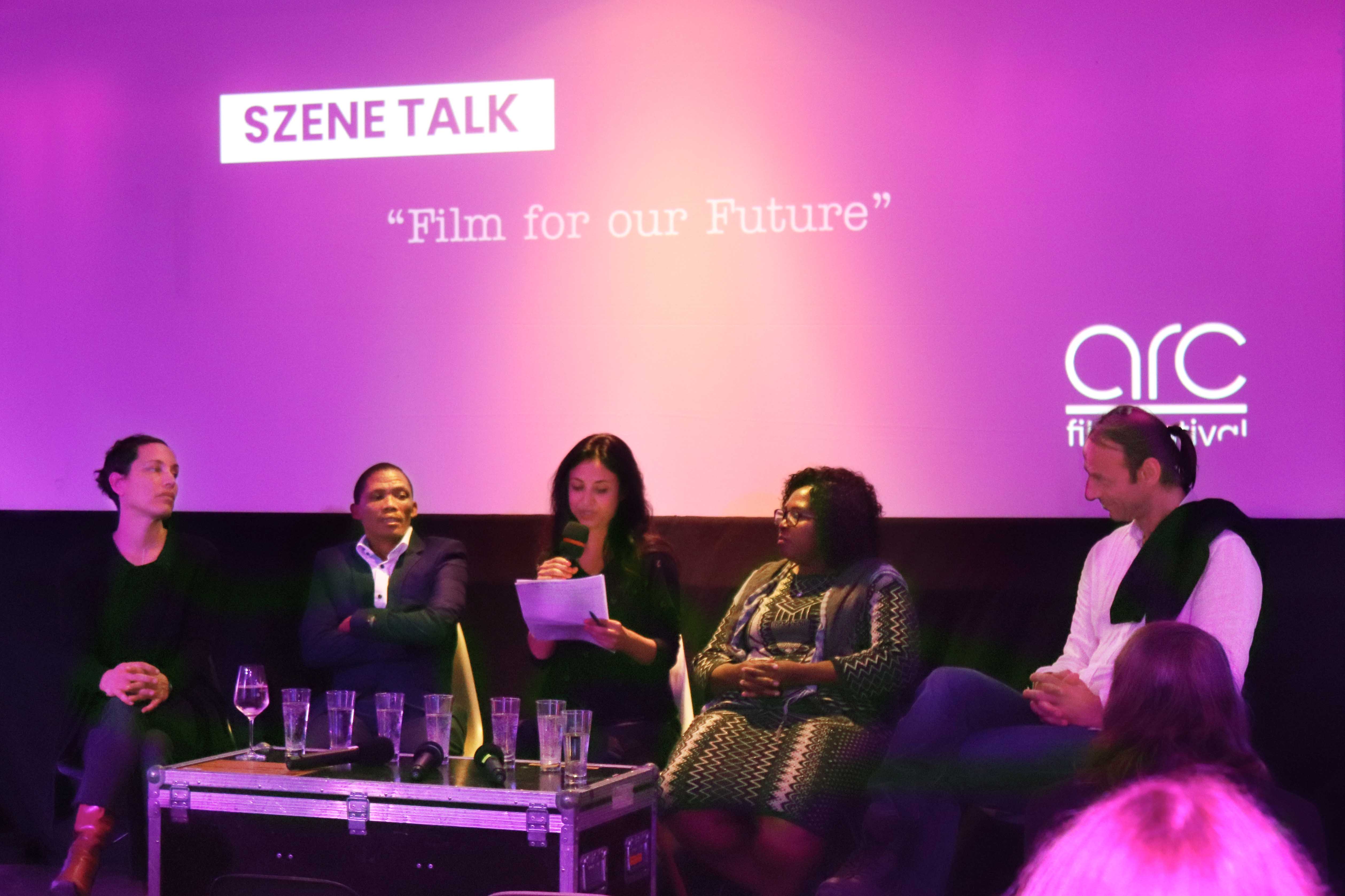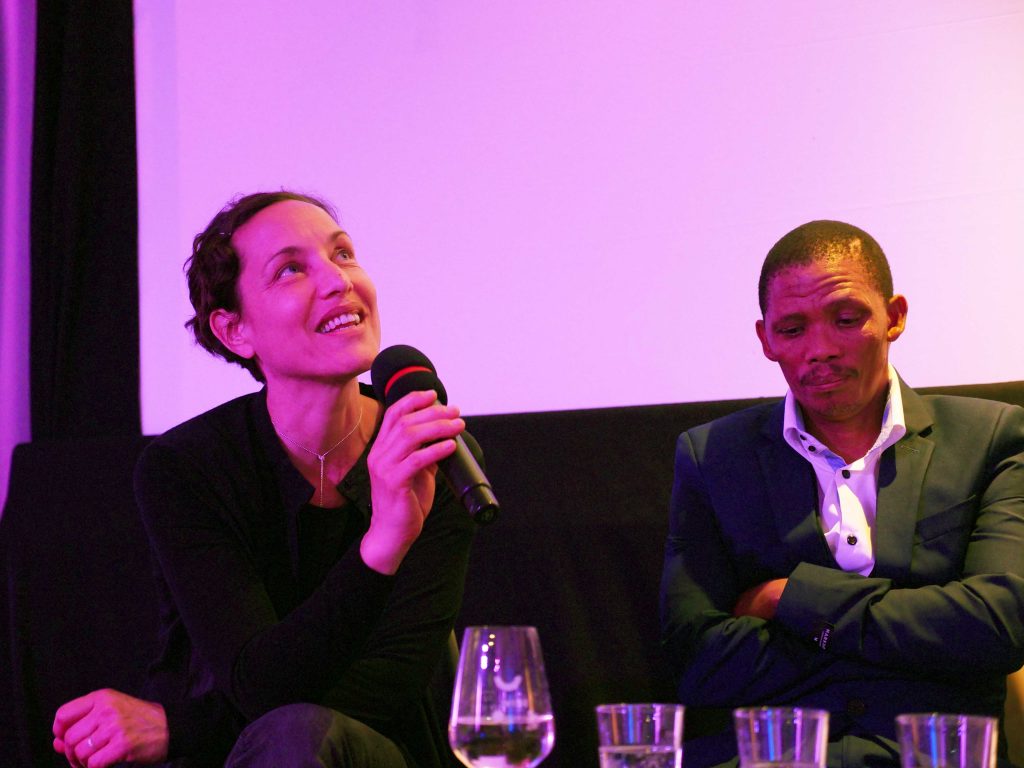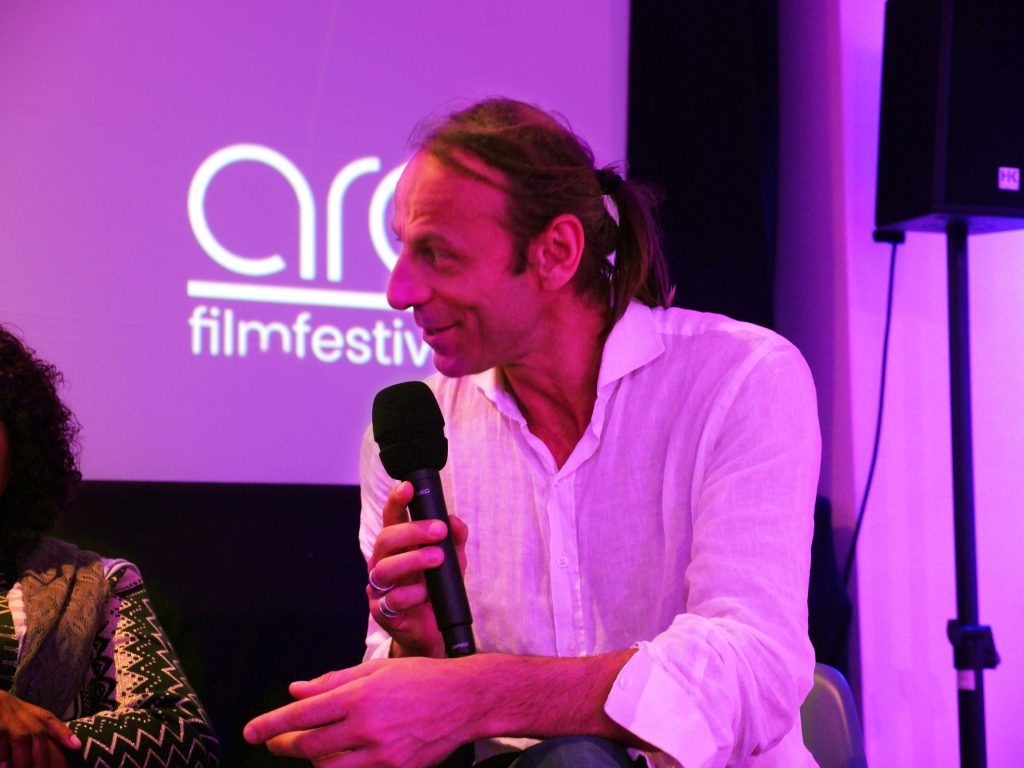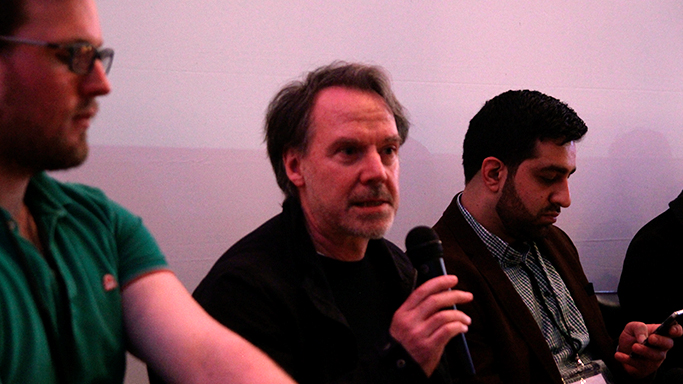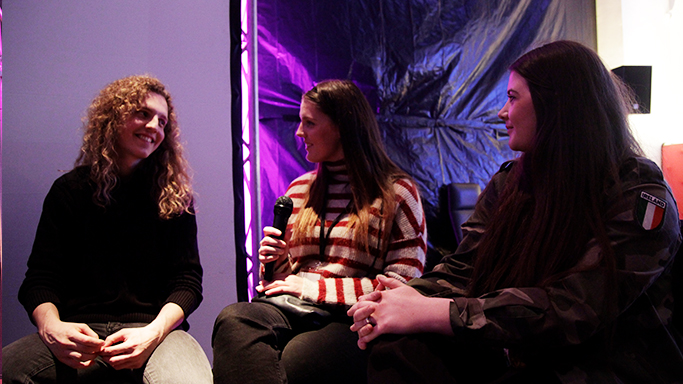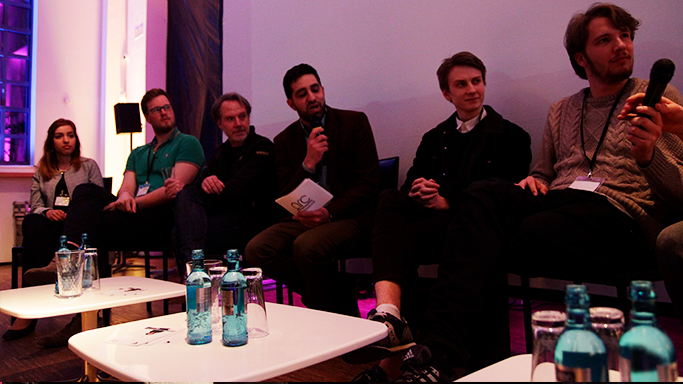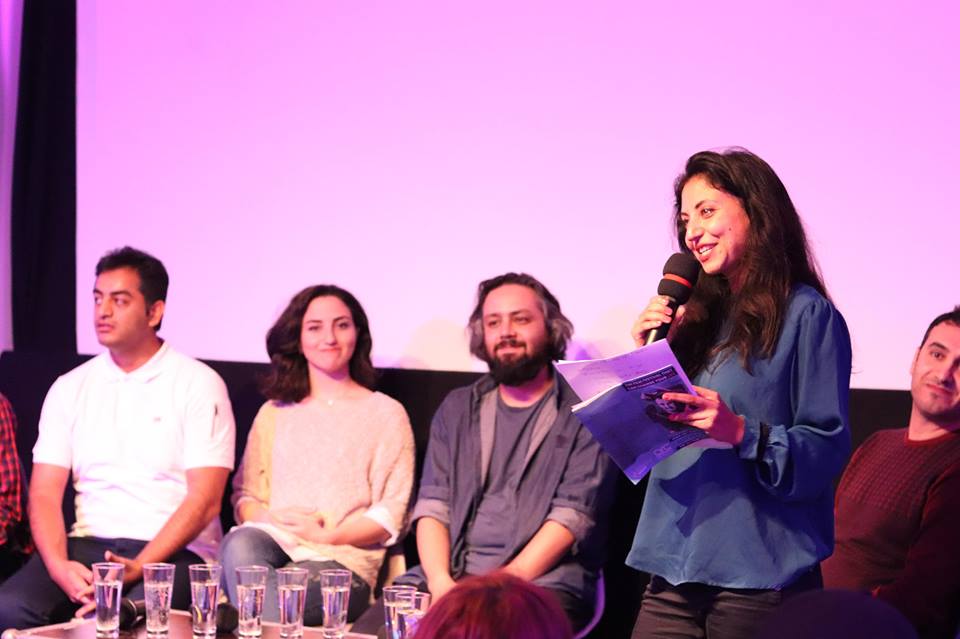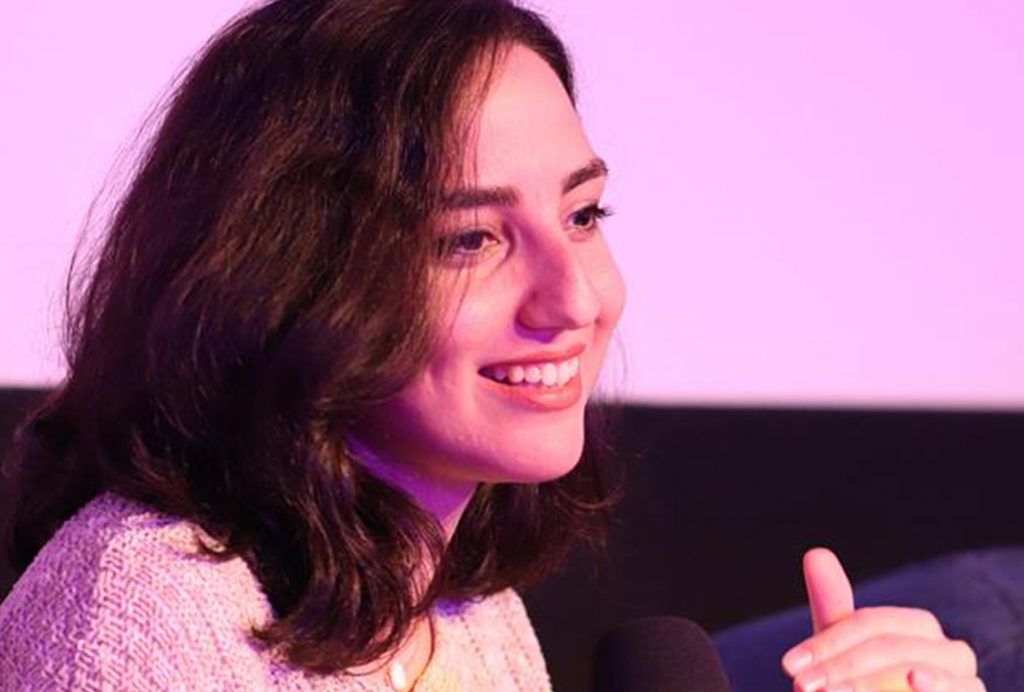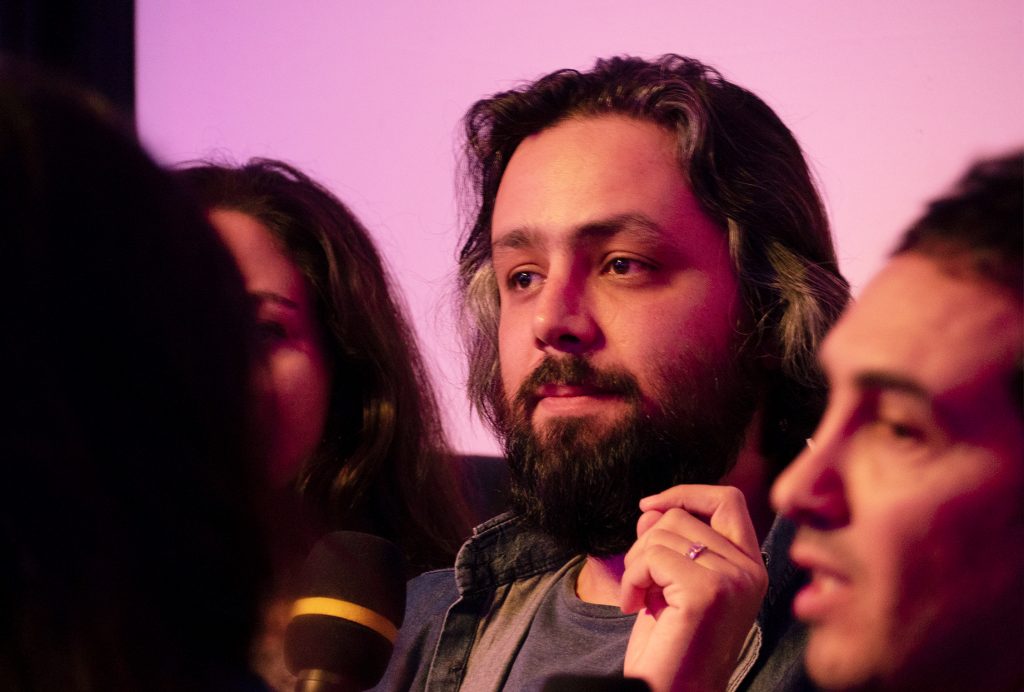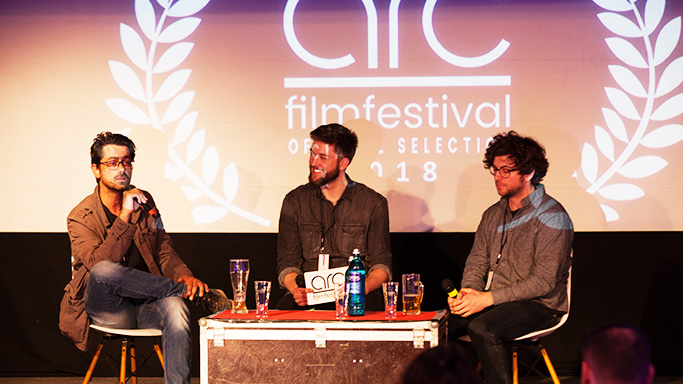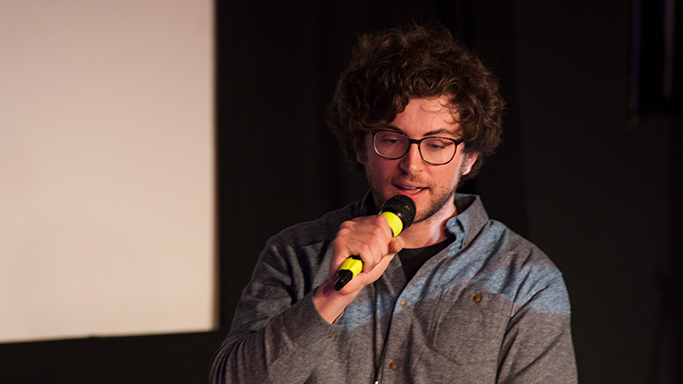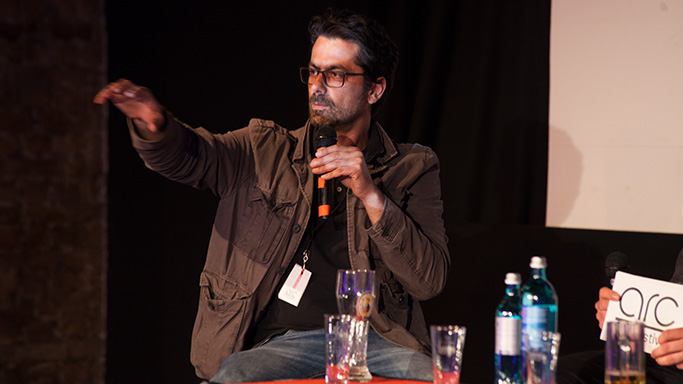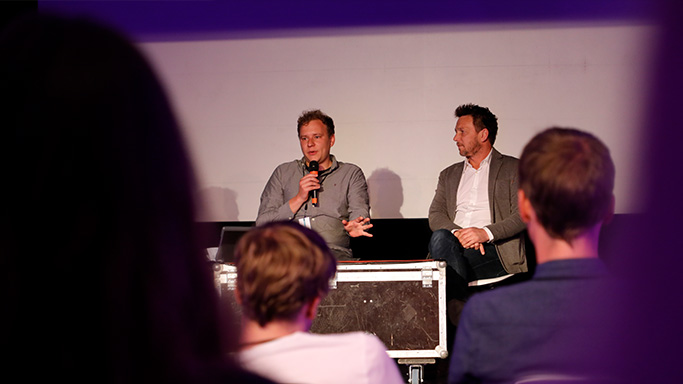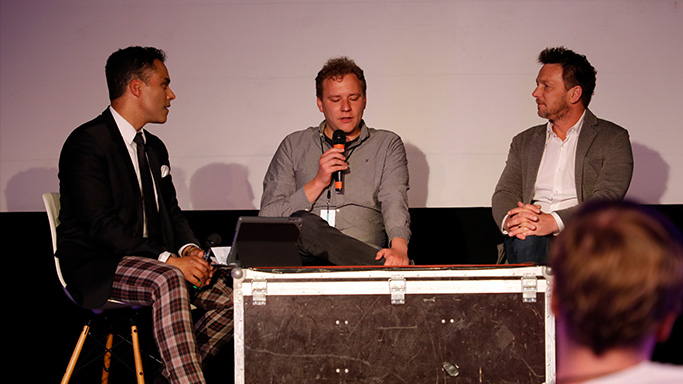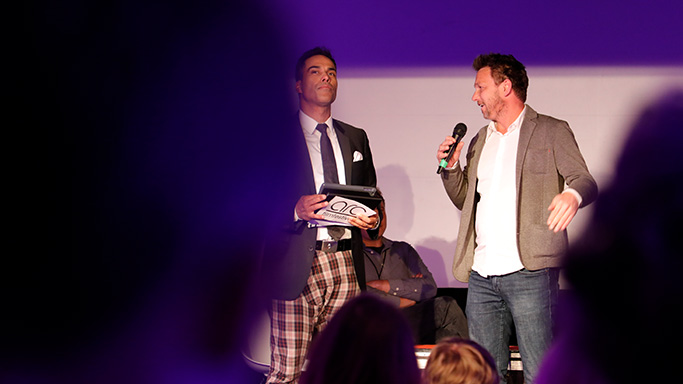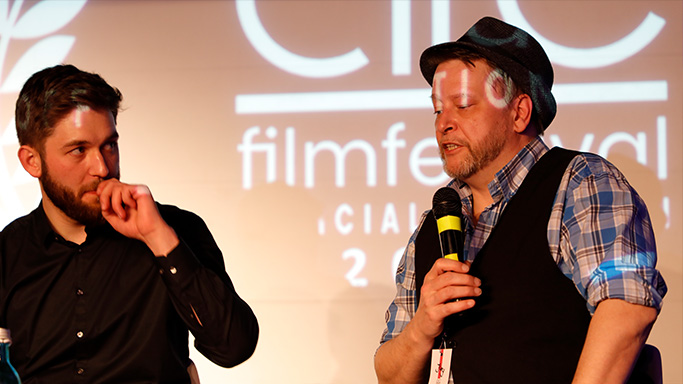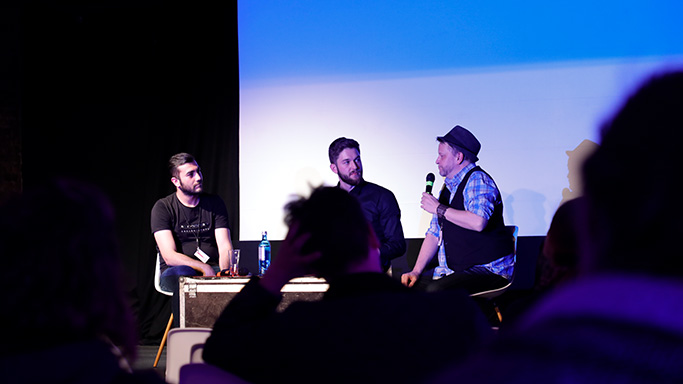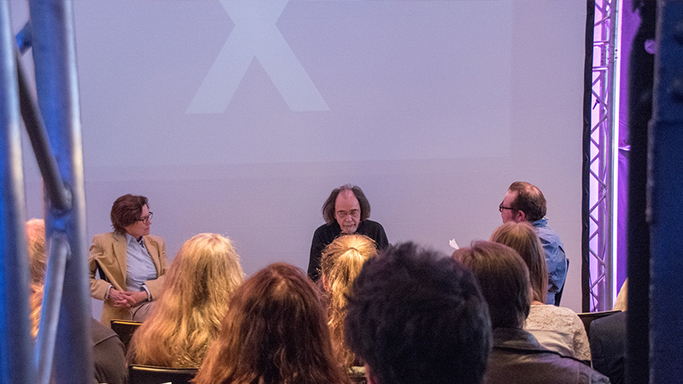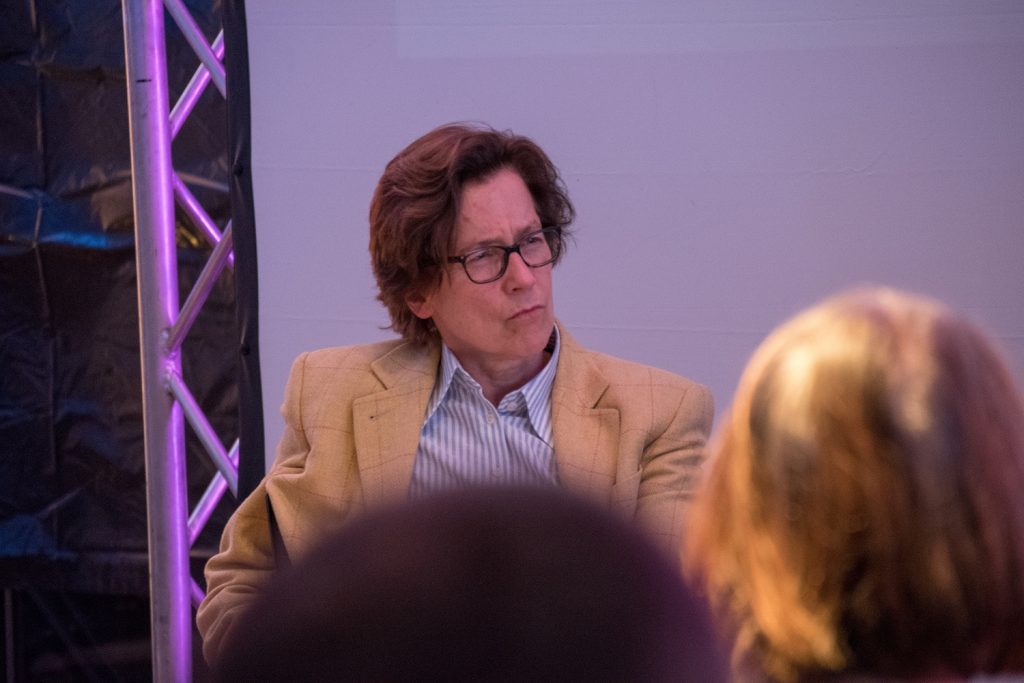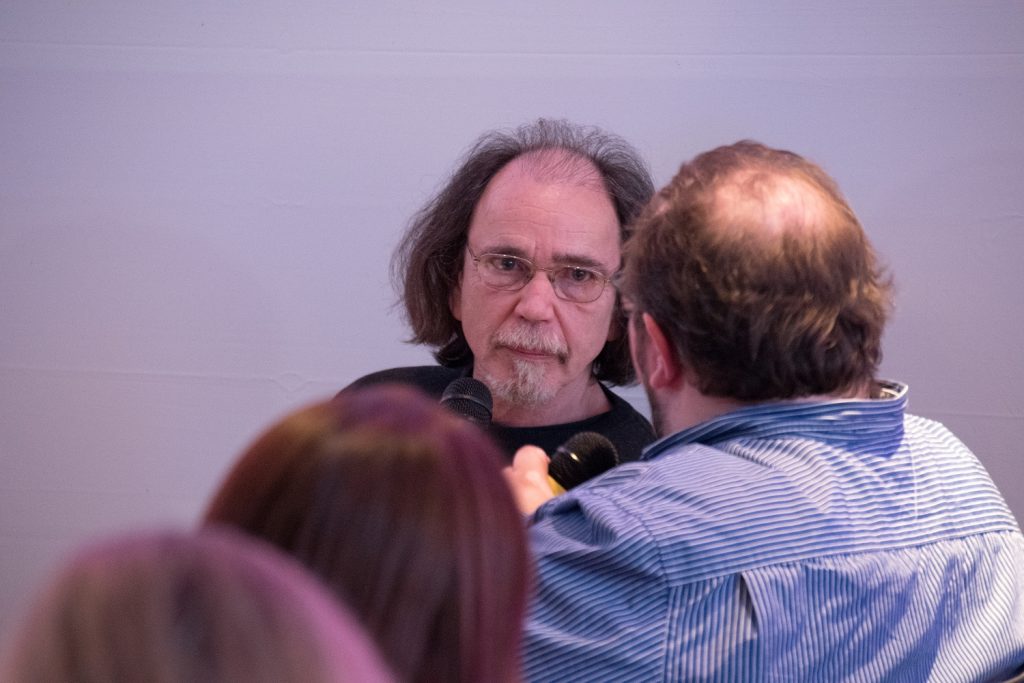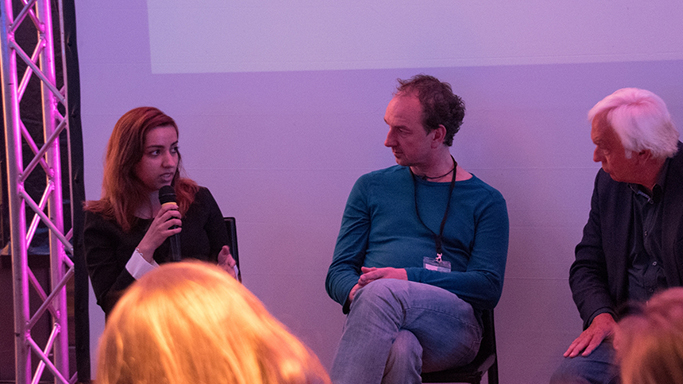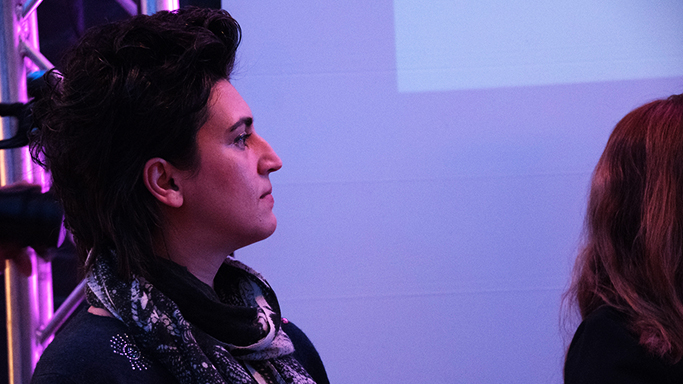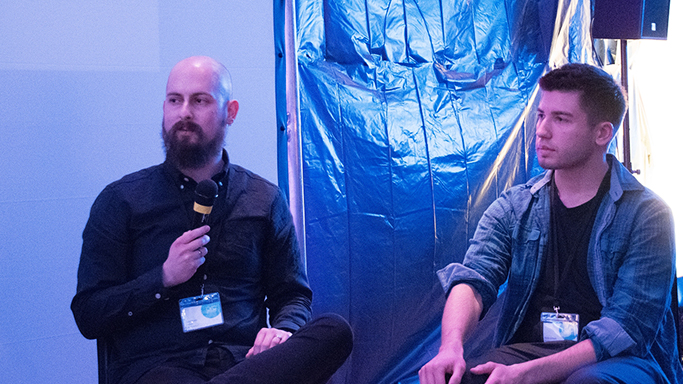Role models in Germany and UK
A lot is going on. We can acknowledge progress when it comes to gender roles. But it\'s still way to early for loud optimism! This years partnership with the LGBT Festival Iris Prize from Cardiff brings the roles of genders of all kind in focus. The Scene Talk is followed by four shorts that face the world with humour far away from the stereo-types. Chair: Patrick Dwayne (actor, Bad Banks) | Photography: Sebastian Matthias & Veronika Bolotina
Phillip Aubel (producer of the QUEER Filmfest Weiterstadt): Philipp Aubel runs the Junge Filmszene in the national organisation for youth and film, curating an information network and running the youth film festival now in its 53rd edition.
Marie Therese Hildenbrand (director, Abjective): With her film Adjective, Marie-Therese Hildenbrand clears up a crazy woman’s issue.
Lisa Miller (producer & director, Landrauschen): In her long film Landrauschen, Lisa Miller develops character roles which until now are rarely to be seen in German cinema.
Kathi Wolf (actress, Landrauschen): Kathi Wolf played the main character Toni in the film Landrauschen.
Hannes Kempert (producer & camera, Landrauschen): Hannes Kempert is the third man in the team behind our opening film Landrauschen.
Capitol, Palatin, Mainz – Quo vadis?
In August, it was first reported that the building of the Palatin movie theatre had been sold. The new owner is the real estate company Fischer & Co. Suddenly fears were expressed that this change of ownership could mean an imminent end for our Art House Cinema. This uncertainty quickly got the citizens of Mainz and cinema fans on the scene, who gathered for an initiative "Mainz for cinema". In our discussion round we present and discuss the demands of the initiative, discuss different perspectives on the need for art house cinemas and explain the urgency of the initiative. What can such an initiative actually achieve? In short: Where is the journey of the Mainz cinema landscape headed?
Host: Jan Peschel (goEast: Head of Management & Organization) | Photography: Marius Grein
Dr. Cecilia Valenti (Film scholar at the Institute for Film, Theatre, Media and Cultural Studies at JGU): Having studied in Milano, Berlin and Bremen she is nowadays researching the milting documentary film in Mainz. She has been a member of the curatorial collective The Canine Condition since 2009 and organises film series in several European cities.
Lukas Maria Dominik (Program manager for feature films FILMZ): He studied comparative studies at JGU, Mainz. Lukas Maria Dominik is an important part of the FILMZ, our favourite event to be in autumn. The festival features German films throughout a week in November.
Carolin Hartmann (Cinema and culture lover from Mainz): Carolin Hartmann is an initial member of the initiative "Mainz for cinema". An open letter, addressed to the designated owner Fischer&Co., the Mainz City Council and Mayor Ebling and Marianne Grosse, Head of Culture and Building, was published and also picked up by the media. The signatories call for a clear perspective for the Mainz arthouse cinemas over several years of planning security.
Perpetrator perspective & Zeitgeist
Uwe Boll is probably the most controversial director in Germany. Originally from North Rhine-Westphalia, Mainz is his adopted home. He made most of his films in the USA and Canada, where he returned from last year. In spring 2021, Uwe Boll shot a film in Germany after a few years break. After the announcement that he was working on the film HANAU, to deal with the right-wing extremist crime of the previous years the media position has been biased. Pieces of a story continue to come together: What role does the perspective play in all this? The weekly news magazine Der Spiegel wrote that Mr. Boll had apparently not yet understood that nowadays a film is told from the victim's perspective. This raises questions about perceiving perspectives and intentions. Is it wholesome to tell a story from the offenders perspective? And does timing according to the true events make a difference? Turing points that hurt like 9/11 or Hanau raise questions in filmmaking that are essential.
Host: Larissa Kohl (Caster and Actress) | Photography: Marius Grein
Dr. Uwe Boll (Film Director): At the film schools in Munich and Vienna, Dr. Uwe Boll initially film direction, later literature and business administration. He did his doctorate in philosophy in Siegen. Since 1991 he has directed and produced more than 45 films including Dafur, Postal, Assault on Wall Street and various video game adaptations and documentaries.
New ways of storytelling
Storytellers find imaginative ways to share ideas. We want to encourage you. You, the audience and you, the filmmaker. The craft of film and the endless opportunities to use the medium is in the center of the 10th Scene Talk of the Arc Film Festival. We thank the filmmakers that have traveled from so far to partake in this innovative discussion. Host: Bahman Kormi (Cinematographer) | Photography: Thomas Banner
Bruno Decc (Director, Two Signs’ Den: Epilogue): The Brazilian filmmaker introduces, a film in an implicit and mostly visual manner, an alternate version of history where global cultural dominance has been established by an African descendant ethnic group. Bruno explains his experimental approach to creating cinematic experiences.
Karen Anstee (Director, Approval Needed): Karen graduated from London Film School in 2012 with an MA in screenwriting. Since then she has written, directed and produced several award-winning short films, with the most recent two being awarded the BFI Mark of Diversity Standards Best Practice.
Ming BadBadMeowMeow (Contemporary Artist, SuperMeowMeow Game of LOVE): The Taiwanese director and artist is challenging the boundaries of the medium. When does film and and game begin? This is not even relevant anymore, Ming is rethinking the traditional concept and opens up new ways of getting her message across.
Film for our future
Film has the ability to change our minds and therefore it partakes in changing the world that we live in. The feature documentary Ghostland brings the older living culture on earth to the Rhine-Main area. Watching our society living the way we do from the perspective of the Ju’/hoansi we have a chance to see our routines from the angle of a civilisation of the past.
In December 2018 nine festival directors came together in Milan to talk about films and their creators that thrive to changing the world for the better. After this scene-Talk Linda Gasser will introduce the shared mission of the network that was founded under the United Nations. Host: Julia Monte (Actress) | Photography: Niklas Doka
Simon Stadler (Director, Ghostland): The director from Frankfurt was able to show his film all over this planet and opened up the view about the society we, the first world, live in from the perspective of the past.
Catania Lerner (Co-Director, Ghostland): Catania Lerner speaks the language of the Ju’/hoansi and she is ambitious that the outcome of the film will support their community. After finding audience all over the world the feature is critically acclaimed.
Fransina Ghauz (Representative in lower chamber): Fransina Ghauz is part of the Course of Commonds in Namibia and stands up for the Ju’/hoansi in the parliament.
G'au Ghauz (Bushman, who saw Ghostland for the first time): G’au Ghauz is visiting Germany for the very first time. He can emphasise with the protagonists in the feature documentary Ghostland very well.
Screenwriting: Norway and Germany
New concepts such as the writers room are becoming popular in the production of TV series. We talk to the television Grimme award-winner Stephan Falk and take a look over to Norway together with our four guests from Oslo. Chair: Vulkan Tüdov (Script writer and philosophy student at the Goethe University in Frankfurt) Interpreter: Marius Grein | Photo: Eva Schmidt & Sebastian Matthias
Stephan Falk (screenwriter): Stephan Falk is a critically acclaimed script writer and winner of the German Grimme Award.
Thomas Gunnar Røtting (author, director, composer, The Rhapsody in Red): The director from Norway is presenting a musical at the Arc Film Festival.
Rebecca Røgnoy und Julie-Marie Wahl (producer, The man who shot himself in the head): The product team from Oslo bring the film The man who shot himself in the head which was written in team work.
Kjtil Onarhim Keen (camera, The Rhapsody in Red): Telling stories in pictures is the passion of the Norwegian cinematophraher.
Christian Zipfel (director, The Bleak Farm): At the Arc Film Festival 2017 Christian Zipfel was studying at the IFS Cologne and is now doing his Masters in Potsdam.
Why "The Paradox Of Freedom" is a bad title - focussing on Iranian film
Among the film submissions were 84 films from Iran. The programmers appreciated the films strong narrative styles and diversity. Making Iran our partner country of 2019 we faced the challenge of inviting most of them. After a difficult process with the embassy we are very glad that six filmmakers from Tehran were able to join the Arc Film Festival in Mainz. We are also glad to welcome Yousef Panahi as honorary gust, brother and producer of Jaffas Panahi. Host: Julia Monte (actress) | Interpreter: Seyed Morteza Zanjani | Photohraphy: Carsten Simon & Hao Ping-Wu
Tanin Torabi (Director, The Derivé): Tanin Torabi is a contemporary dance artist and curator based in Iran. She works in the realm of performance, choreography, and film, and enjoys exploring the connection between the three.
Reza Atefi (Regisseur, Movement): Reza Atefi presents a subtle work. In his film Movement he introduces us to the life of a simple man in a simple life in the land of Iran. While international media speak of threats and agreements interchangingly, he seizes the smallest movements of all.
Amir Falaki (Regisseur, The old man and the dead): Amir Falaki is representing the young generation of Iranian filmmakers. He does not want to fight the political system. All he wants to do is great films. The day after the Scene Talk he wins the Audience Choice Award with his film The old man and the dead.
Ayat Asadi Rahbar (Regisseur, Raheel): Ayat Asadi Rahbar brought a film from Iran that deals with the life of an Afghan immigrant, more precisely of an Afghan woman. One of the many questions brought up in his film work: Can a human be illegal?
Bahman Kormi (Cinematography): Bahman Kormi is a german cinematographer with roots in Iran. Partaking in the Board Of Jury 2019 he has not only seen all the films represented by our guests but also understands how to distinguish the undertaking and methods.
360° - Emerging the production horizon
The new panaromatic experience provides new ways to tell stories, but also many challenges. We take a closer look at the work-flow emphasising the camera work. Thursday: Camera work in 360°, Friday afternoon: Audio in 360° and Saturday: Directing 360°)
In the edition 2018 we included four 360° films into the official selection and offer a workshop held by ZDF Digital who are giving a deep inside with Hands On for emerging talents in the new fields. On Saturday afternoon we proudly present a new edition of the Directors' Coffee giving directors to hand what they need to be thinking about when entering the new medium.
Chair: Niklas Heuer-Jungemann (Upcoming producer, Mainz) Photography: Niklas Doka
Harald Capota (camera, ZDF): Together with our partner ZDF Digital one of the most elaborate productions in the field of 360° film was created. Harry Capota is an experiences cinematographer who knows about the difficulties in the workflow with the new technology and gives us an insight into this massive production.
Markus Biersack (camera): One might consider the experimentation with moving images in 360 degrees to be at the forefront of the avantgarde. After working for two years on his documentary that he produced in four countries travelling with the new technology Markus Biersack shares his experience with us.
A Cinematic Outlook
Rheinland-Pfalz still has no film funding body. The Mainz based TV channel ZDF buys danish screenwriters instead of developing local talent and German film does not fare well internationally. Not yet, anyway. We are grilling for the chances for the future! Where is the unused potential and what might the German film industry of the future look like? The Arc Film Festival itself is perhaps an answer to these questions. We look towards the UK for some hints about the future development.
Chair: Patrick Dewayne (Actor, Bad Banks) Photography: Sebastian Matthias
Tidi von Tiedemann (producer & director, Kontrastfilm): The producer from Mainz is a long standing campaigner for the development of a film funding body here in Rheinland-Pfalz. Tidi von Tiedermann is tireless in his engagement for the future of German film and being our patron of the year we are glad to include his view into this urging theme.
Clemens Maiunke (camera): Clemens Majunke is a German cinematographer who has been living in Great Britain for several years. In this roundtable he is the link to our partnership with the United Kingdom and sensitises for the upcoming changes according to the Brexit. In this Scene Talk he is also the one to look at the German film industry from a distance.
Media Ethics: Repetition
"History repeats itself" is an oft-repeated maxim. And looking carefully at the facts, some troubling old methods of manipulation are at play. To gain a better insight we talk to a filmmaker who deals with the media landscape of the Third Reich. Germany witnessed major changes to its identity during the 20th and 21st century. Those changes determined the periodisation of national cinema into a succession of distinct eras and movements. Now we are facing times where it becomes very relevant again to talk about the influence and responsibility that media has.
Chair: Niklas Heuer-Jungemann (Upcoming producer, Mainz) Photography: Niklas Doka
Tom Greiner (producer & director, Vierte Wand Filmproduktion): Director Tom Greiner takes a critical look at history in his films, as exemplified in his current project "Love letters to Hitler" concerning the Nazi period. Carefully observing the media according to the new possibilities on the internet, he is very conscious and understands the practice.
Sharo Moosavi (prospective media designer, Vierte Wand Filmproduktion): Sharo came to Germany as a refugee. Now he is studying to become a media designer at Vierte Wand Filmproduktion. He opens up and gives a valuable insight into his perspective on the german media.
Film as art - back then, nowadays and in the future
As art is almost always internally in conflict, so it sparks discusssion on contentious issues. This year\'s partnership with the world\'s only monochrome film festival gives us food for thought on the theme \"black and white\". Inviting a head editor of Arte, the European TV channel that promotes cultural programming and a commissioner of the Oberhausen Kurzfilmtage, one of the oldest short film festivals that exist, we want to dig deeper.
Chair: Jan Czmok (Producer, Spektrumfilm) Photography: Eva Schmidt & Sebastian Matthias
Rheinhard W. Wolf (leader, Ciné Mayence): Reinhard Wolf is a long-standing member of the selection committee for the Oberhausener Kurzfilmtage, one of the oldest short film festivals in the world. Being the leader of the beloved Stadtkino Cine Mayence he is enriching the cultural programme of the city of Mainz.
Media Ethics - more explicit: Handling the theme war
The media carry a great responsibility. The late Venice Film Festival juror Werner Schneider-Quindeau talks to upcoming filmmakers about current affairs and their relationship with the media. The panelists all presented their work in the previous section of the festival which put how the media deal with war in the spotlight. Chair: Werner Schneider-Quindeau (Pastor, St. Catherine's Church, Frankfurt) Photography: Eva Schmidt & Sebastian Matthias
Bahar Embrahim (director, Kinder sind Engel): In her film "Kinder sind Engel" Bahar Ebrahim deals with war from the perspective of a child.
Kimia Eyzad Panah (writer & director: Fighter): The young director from neighbouring Hesse had two of her films showcased at the first edition of the Arc Film Festival.
Daniel Alznauer (director, Die Rückkehrer): Daniel Alznauer met two war photographers and portrayed their life in between two worlds.
Björn Brunke (camera, Die Rückkehrer): Doing the camera work for the documentrary feature "Die Rückkehrer", Björn Brunje found a subtle way to protograph the war photography of its protagonists.
